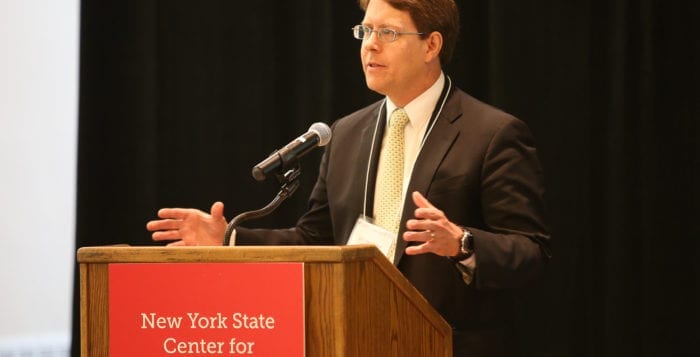SBU’s Harold Walker focuses on clean water

By Daniel Dunaief
Water, water everywhere and Harold “Hal” Walker is making sure there’s more than a few drops on Long Island to drink. The head of the new Department of Civil Engineering at Stony Brook is one of two co-directors of the Center for Clean Water Technology. The center received a $5 million commitment from New York State to pilot test a variety of ways to remove contaminants from drinking water.
“The center will be working with water authorities and water utilities to do pilot testing of new technology to deal with emerging contaminants,” Walker said. “One goal of the testing will be to collect information needed to assess new technologies and, if they are effective, to get them approved so they can be used by water utilities.”
Contaminants the center will explore include 1,4-dioxane and perfluorinated compounds, which have “turned up in some regions of Long Island,” Christopher Gobler, the co-director of the center and an associate dean for research and professor at the School of Marine and Atmospheric Sciences, explained in an email.
’One lesson we have learned is that it is critically important to protect the environment, since the environment serves as a natural buffer to these large storms.’ — Harold Walker
The technologies the center will test likely include novel membrane processes, advanced oxidation, novel absorbents and advanced oxidation processes. The center will explore “how these compounds are removed in conventional drinking water treatments processes,” Walker said. “If they are not removed sufficiently, what do novel technologies use and are they ready for the pilot stage?” Walker acknowledges that staying ahead of the curve in being prepared to protect drinking water requires an awareness of numerous new compounds that are a part of modern manufacturing.
Gobler said the center’s findings would be made public. New York State had previously committed $3.5 million from the Environmental Protection Fund to support the center. With an additional $5 million in funding, the center will develop new technologies to improve drinking water and wastewater quality on Long Island, according to the State Department of Environmental Protection.
The center was formed originally to focus on innovative alternative individual onsite treatment systems for reduction of nitrogen and pathogens. That was broadened this year to focus on the impact of emerging contaminants on water supplies, a representative from the DEC explained in an email.
Walker has built an expertise in developing and applying membrane processes for drinking and wastewater. At Ohio State University, where he worked from 1996 until 2012, when he came to Stony Brook, he spent considerable time analyzing drinking water in the Great Lakes. Gobler appreciates Walker’s expertise.“
He has worked with many federal and state agencies on these topics across the United States,” Gobler explained. “He is also well-versed in wastewater treatment technologies.”
Jennifer Garvey, the associate director for the center, meets with Garvey and Walker at least once a week. She also connects weekly for a call or meeting to discuss administrative and strategic issues. Walker is “at the leading edge of water treatment approaches and he understands where opportunities and obstacles lie,” Garvey said. The center has a sense of urgency about the work because “there is such a clear and immense need for wastewater infrastructure improvements,” she continued. The targeted and strategic work emphasizes near-term solutions. A leading focus is a nonproprietary passive system known as a nitrogen removing biofilter that they will be piloting in Suffolk County soon. “Our hope is that we can make systems available for widespread deployment within the next two to three years,” she said.
Apart from his work at the center, which Walker estimates takes about a third of his time, he is also a professor and the founding chair of the Department of Civil Engineering, which conferred bachelor’s degrees on its inaugural 13 undergraduate students this summer. Those students have all found engineering jobs within their field of interest or continued to pursue additional schooling. The civil engineering department has 10 faculty and is at the end of the first phase of its growth and development, Walker said.
Phase II will include building out the faculty and staff, developing new research and teaching labs and enhancing the recently approved master’s of science and doctoral programs in civil engineering, Walker explained. Resiliency of the coastal communities is a major thrust of his department. He said he recently hired a number of faculty in this area and launched an Advanced Graduate Certificate in Coastal Zone Management and Engineering in partnership with the School of Marine and Atmospheric Sciences. “One lesson we have learned is that it is critically important to protect the environment, since the environment serves as a natural buffer to these large storms,” he explained.
Apart from water and the resilience of the coastal community, the civil engineering department is also involved in transportation. The department works with Farmingdale State College in a new Infrastructure, Transportation and Security Center. In that effort, the department collaborates with the Department of Computer Science, among others at Stony Brook, to bring new approaches to “improving the efficiency, sustainability and safety of our transportation system.”
For his part, Gobler welcomes the talent and expertise the civil engineering department brings to Stony Brook. “This is a tremendous asset” for Stony Brook, Gobler explained in an email. “Civil engineers solve complex problems and I have found that [Walker] and the people he has hired have the skill set and mind-set to address many environmental problems that are important on Long Island.
A resident of Port Jefferson, Walker lives with his wife Alyssa, who is a writer, and their three children, Abby, 14, Halliway, six, and Northie, who is five. They enjoy visiting the beach and traveling east to go apple and pumpkin picking. A native of Southern California, Walker started surfing at the age of 10. He was a four-year varsity letterman in surfing when he was in high school. He has surfed in Hawaii, Costa Rica, Japan, Portugal and Mexico.
As for the department, he said he feels excited by the responsibility for building only the second civil engineering program in the SUNY system. “I’d like the department to quickly become nationally recognized and be the leading source of expertise for the state on infrastructure issues, especially in the downstate area,” he said.






